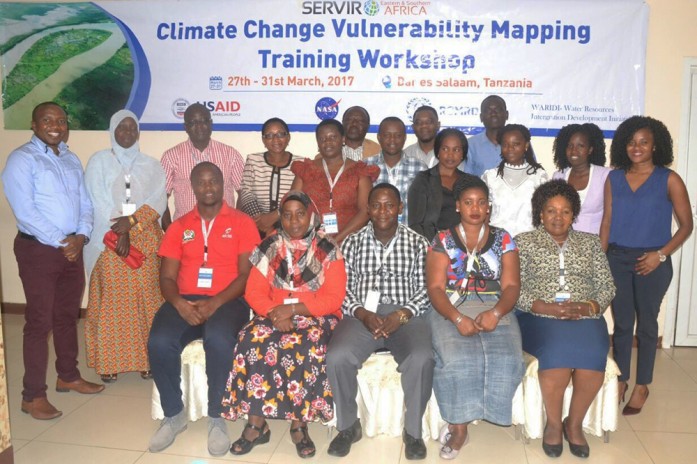
SERVIR E&SA is collaborating with USAID/Tanzania’s Water Resources Integration Development Initiative (WARIDI) in applying expertise and tools to better understand climate change
vulnerability and adaptation issues in the Wami-Ruvu and Rufiji river basins of southern Tanzania. WARIDI is a 5-year project providing support in water resources governance, water supply, sanitation and hygiene, and livelihoods to basin water boards, local governments and inhabitants of the two basins.
Working with regional partners among them PREPARED, ICPAC and FEWS NET and national partners in Tanzania among them Tanzania Meteorological Agency (TMA) and the Ministry of Water and Irrigation (MOWI), SERVIR E&SA is helping WARIDI develop climate change adaptation products by carrying out climate change vulnerability mapping as a product to inform impacts assessments and development of climate change adaptation measures to strengthen water use and allocations and improvement of livelihoods in the two basins.
“We are using experiences from working with PREPARED in the past 3 years and our earlier experiences working in Malawi to develop climate change vulnerability products and tools to inform climate change adaptation investments in the East African Community and Malawi respectively,” said Denis Macharia, SERVIR E&SA Weather and Climate Lead.
He continued, “for instance, we are employing vulnerability and analysis methods that we have developed and improved over the past few years together with international partners such as CIESIN.”
The first product being developed is a community climate change hotspot map for the two basins. These maps and the associated products will help WARIDI prioritize their interventions in 20 districts they are targeting in the basins.
“Further, we are approaching this work in a collaborative and co-development way through the formation of a core team of experts in Tanzania drawn from main government agencies working with WARIDI, including experts from local government authorities in the basins and water basin councils,” Macharia added.
The experts are being trained on data management and climate vulnerability mapping and in turn, they will work with SERVIR E&SA’s team to co-develop the products required by WARIDI.
“For us, it’s an approach we have applied elsewhere and one that has demonstrated value. Apart from ensuring sustainability by building a team of experts that can support projects in future, we are also giving them an opportunity to network with SERVIR and RCMRD and leaving behind a suite of tools developed through SERVIR and other initiatives that can help them in their activities,” said Macharia.
The training has been taking place in Dar es Salaam, Tanzania from 27-31st March, 2017. 18 technical staff (9 male and 9 female) drawn from nine institutions are participating. Several other trainings are planned for the next three months and it’s expected that upon completion of the trainings, the team will have produced outputs that will feed directly into WARIDI programming in the two basins.
Content for this article provided by Denis Macharia, Disaster Lead (RCMRD/SERVIR-Eastern & Southern Africa).














